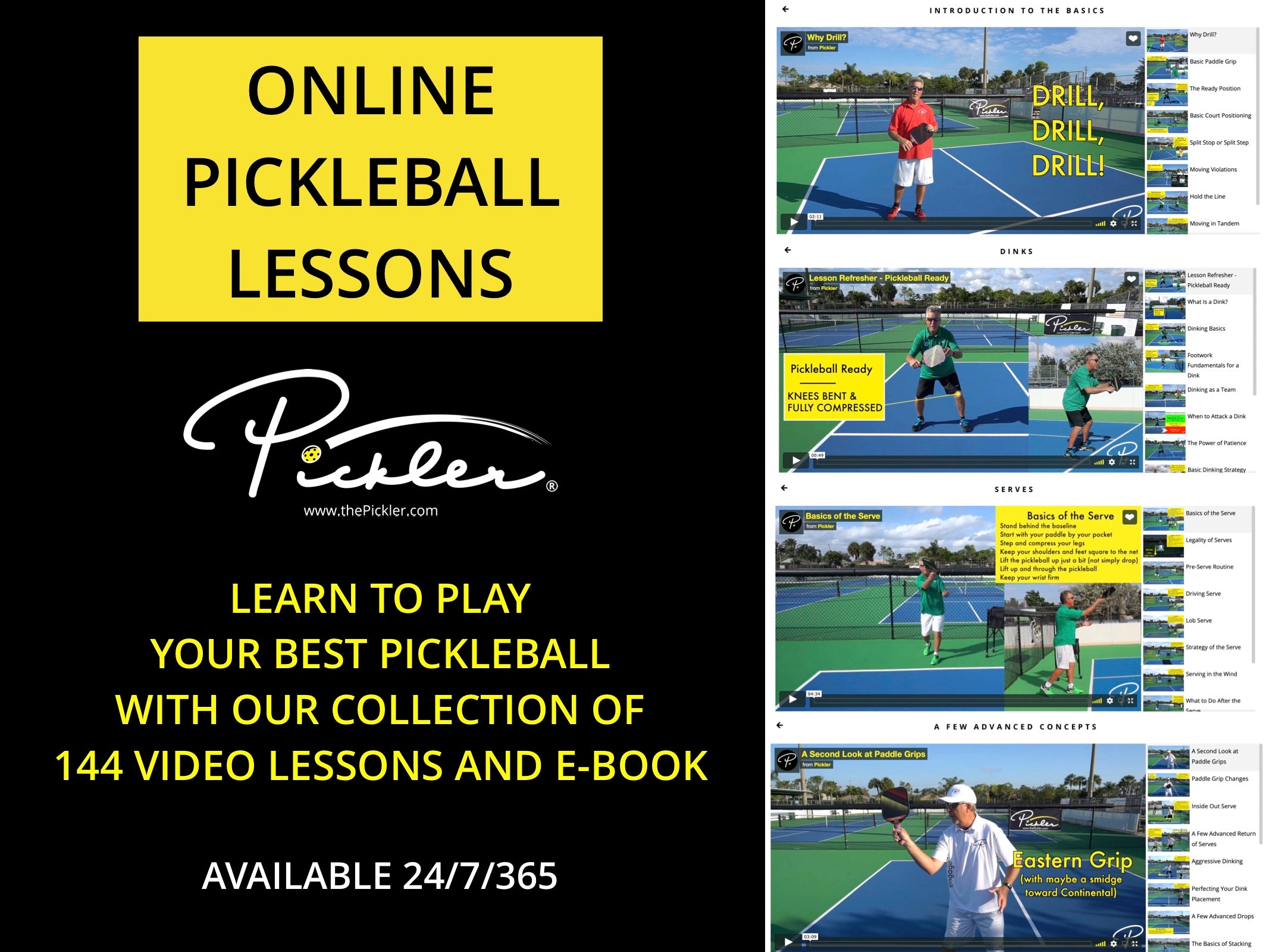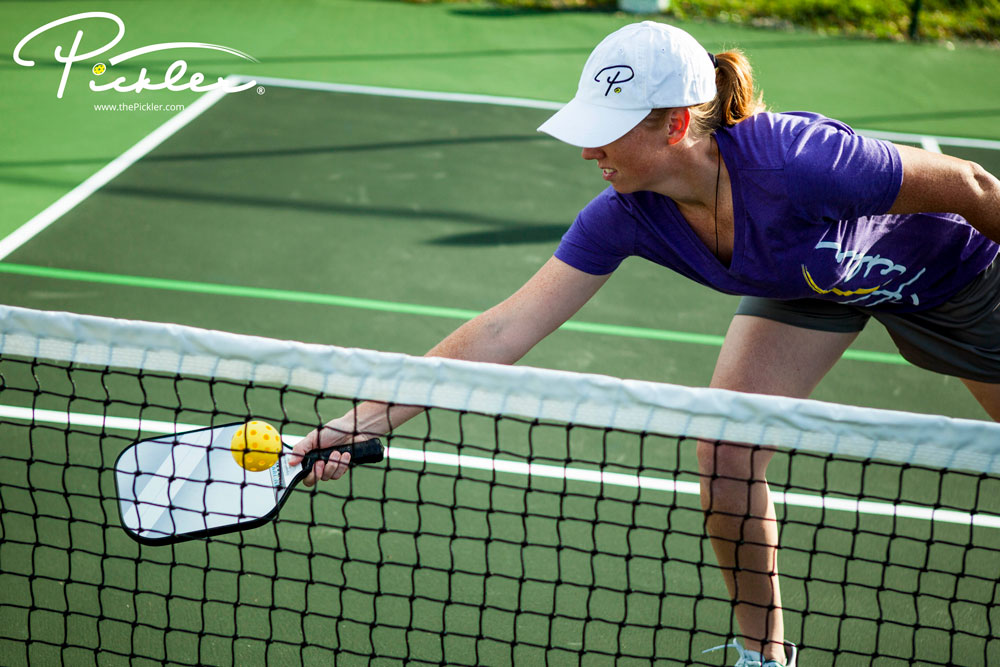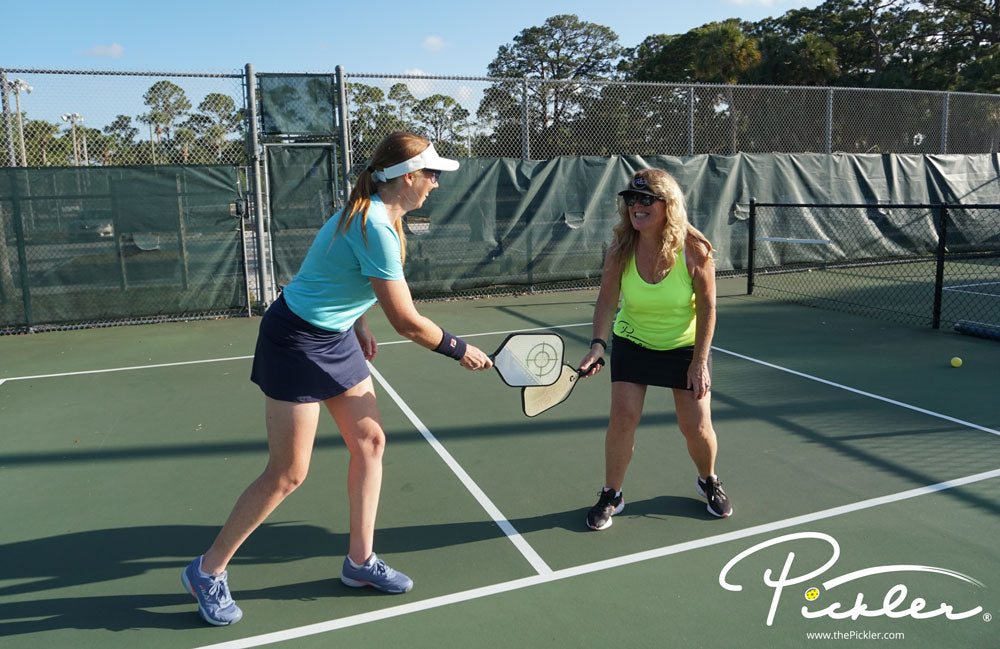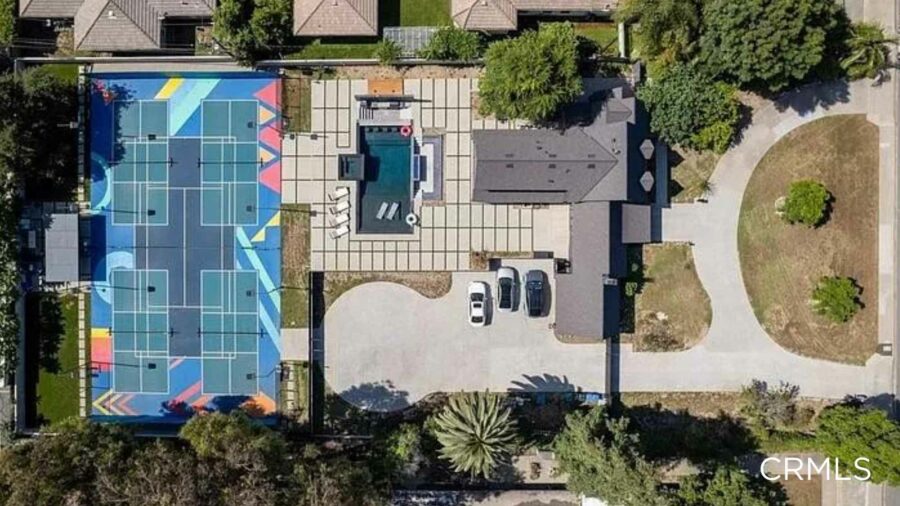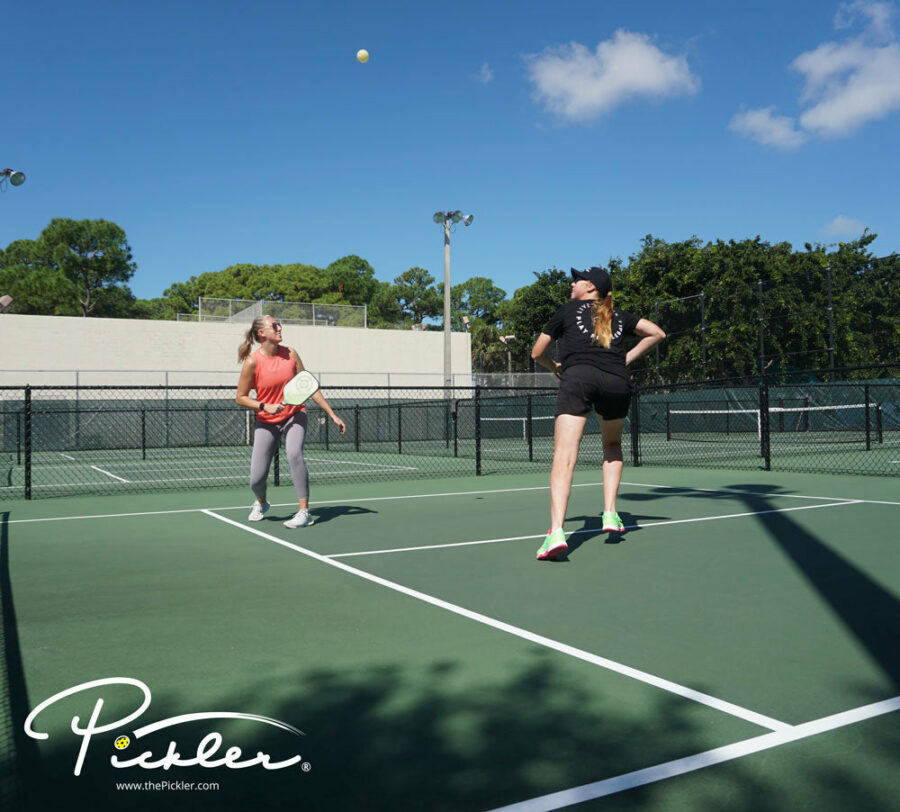A dink is a controlled shot in the sport of pickleball, where you hit the pickleball into the Non-Volley Zone (also known as the Kitchen) on your opponents’ side of the court. All four players in pickleball doubles will generally be at the Non-Volley Zone Line when you are hitting a dink.
A dink can be both an offensive shot (where you put pressure on your opponents to make a mistake or pop-up the pickleball for an easy put away) or a defensive shot (where you are trying to relieve pressure from your opponents’ strong shot and neutralize the rally). In either scenario, the goal of the dink is to hit a shot that is unattackable by your opponents. Unattackable dinks have an apex (or highest point on the arc of a shot) on your side of the pickleball court and land in your opponents’ side of the Kitchen, so that your opponents cannot volley the pickleball, but rather must let the pickleball bounce. The goal is to keep your dinks low, so that your opponents have to hit up on the pickleball to get the pickleball back to your side of the pickleball net.
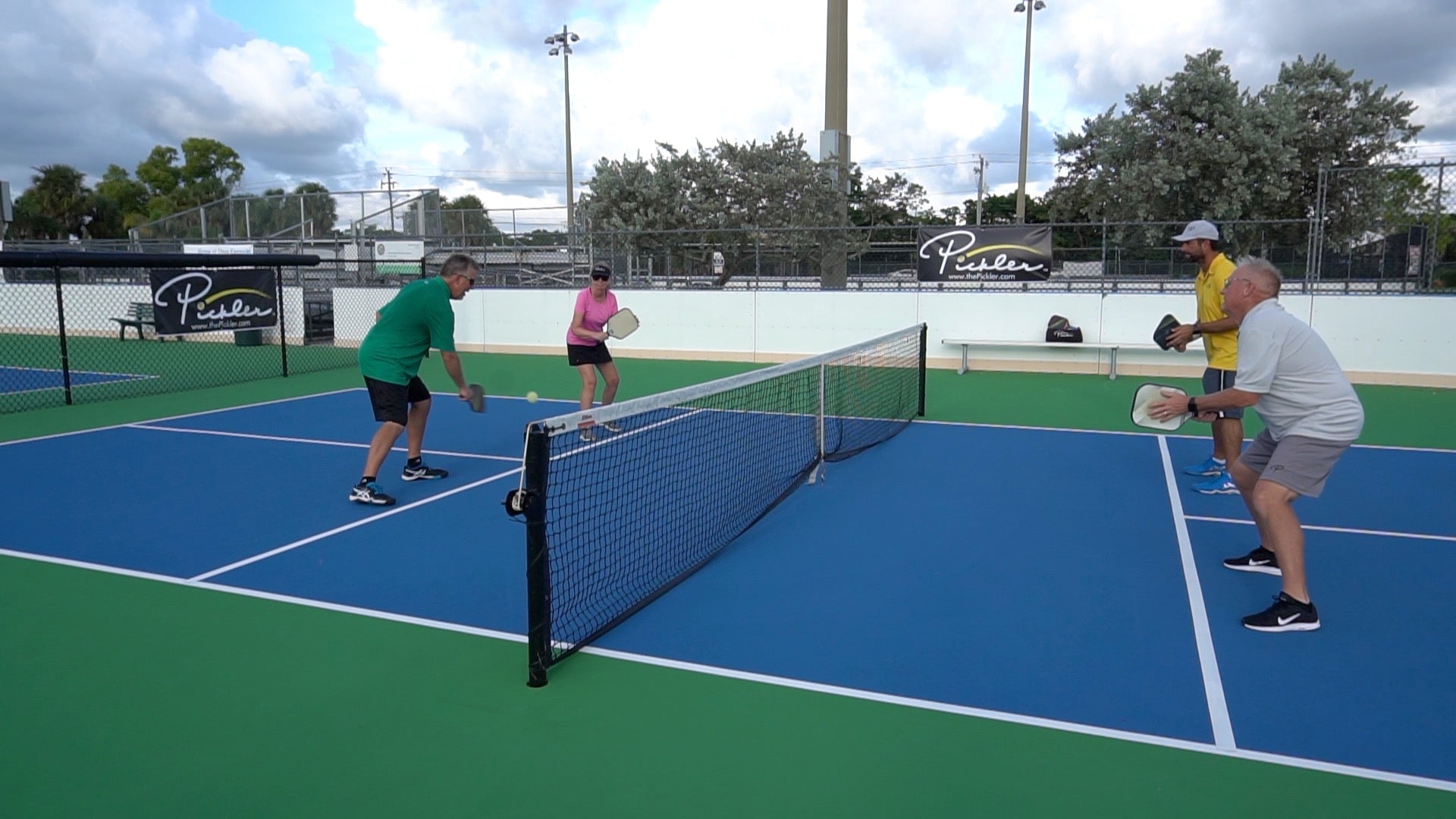
There are 11 steps to hitting the perfect pickleball dink:
- Prepare Your Body – To prepare your body, compress into an athletic stance, with your knees bent and your feet about shoulder width apart. Think of this athletic stance like a football player, hockey player, baseball player, etc., where you are compressed and ready to react.
- Prepare Your Paddle – Keep your pickleball paddle out front of your body and with a relatively loose paddle grip. It is imperative that you make contact with the pickleball out in front of your body. This will help you have the most consistency on the pickleball court. Also, the loose paddle grip will help you have better feel when you strike the pickleball. Lastly, take short, compact backswings and follow throughs with your dink shot. This will help with control and readiness.
- Watch the Pickleball – This one goes without saying, but, too often, players mishit a pickleball simply because they do not watch the pickleball all the way to their paddle. Watch the pickleball!
- Move Your Feet – It is important to move your feet on the pickleball court. This also holds true when dinking at the Kitchen line. To note, when dinking, try to keep your body parallel to the Kitchen Line. If you need to reach for a dink, take a lateral step with your foot closest to the pickleball, rather than a crossover step. A crossover step will take you out of your important ready position, so that you will not be prepared for the next shot. Again, if you need to reach for a dink, take a lateral step with your foot closest to the pickleball, strike the pickleball, and then immediately step back and get back in your ready position.
- Hold the Line – Try to keep your feet at the Non-Volley Zone line. If you step back, you will expose your feet (giving your opponents an easy target to apply pressure), give your opponents more court space to place dinks and more angles to hit better dinks, and make your dinks more difficult because you will be farther from the pickleball net. Plus, you will give your opponents more time to react to a shot, which is the opposite of what you want. So, try to keep your feet at the Kitchen line. With that said, if your opponents hit a quality shot at your feet, or maybe even a fastball that you need more time to react to, do not hesitate to take a small drop step back off of the Non-Volley Zone line. If you do this, stay compressed, hit your shot, and then quickly get back to your ready position and step back in to the Non-Volley Zone line. Try not to retreat; hold the line (most points are won there)!
- Protect Your Feet – Try not to let the pickleball travel toward your feet when dinking. Dinks that travel near your feet are difficult to react to and hit an unattackable shot off of. Comfortably extend your pickleball paddle out in front of your body and protect your feet when dinking. To do this, take the ball out of the air when it is comfortable (in other words, when you are not overextending to reach the pickleball). By taking the pickleball out of the air at times, you will better protect your feet and apply more pressure on your opponents by giving them less time to react to your shot. But, do not overextend yourself, which will result in unforced errors and less aggressive dinks.
- Get Under the Pickleball – When striking the pickleball for a dink, get your paddle under the pickleball. If you are staying compressed in your ready position, you should be able to see the underside of the pickleball strike your paddle.
- Gently Lift Through the Pickleball – Once you strike the pickleball for a dink, gently lift up and through the pickleball. The lift comes from your shoulder, rather than from your wrist or elbow (for instance, think of this like a pendulum swing from your shoulder). Again, this should be a controlled motion with a firm wrist, rather than a sharp jerk with any wrist snap. With practice, you will be able to find the right amount of force and lift to consistently hit the unattackable dink.
- Respect the Net – The height of the apex of the dink is important. Give yourself some margin of error over the top of the pickleball net. While it is important to keep your dinks low and unattackable, if you hit the pickleball too low, you will hit your dink straight into the net and take yourself out of the point.
- Stay Low Through Contact – To finish your dink, be sure to stay relatively compressed. This is a balance because you should engage your legs for stability and control, but you should not stand completely up on your shot. If you stand up, then your paddle will come up with you, which will, in turn, cause the pickleball to be hit with too much height—and be attackable. So, engage your legs throughout your dink, but stay low through contact, so that you control the height of your dinks.
- Revert to Ready – After you finish your dink, quickly revert back to your ready position. You need to be ready for the next shot, whether it is another dink, a surprise fastball, or a lob.
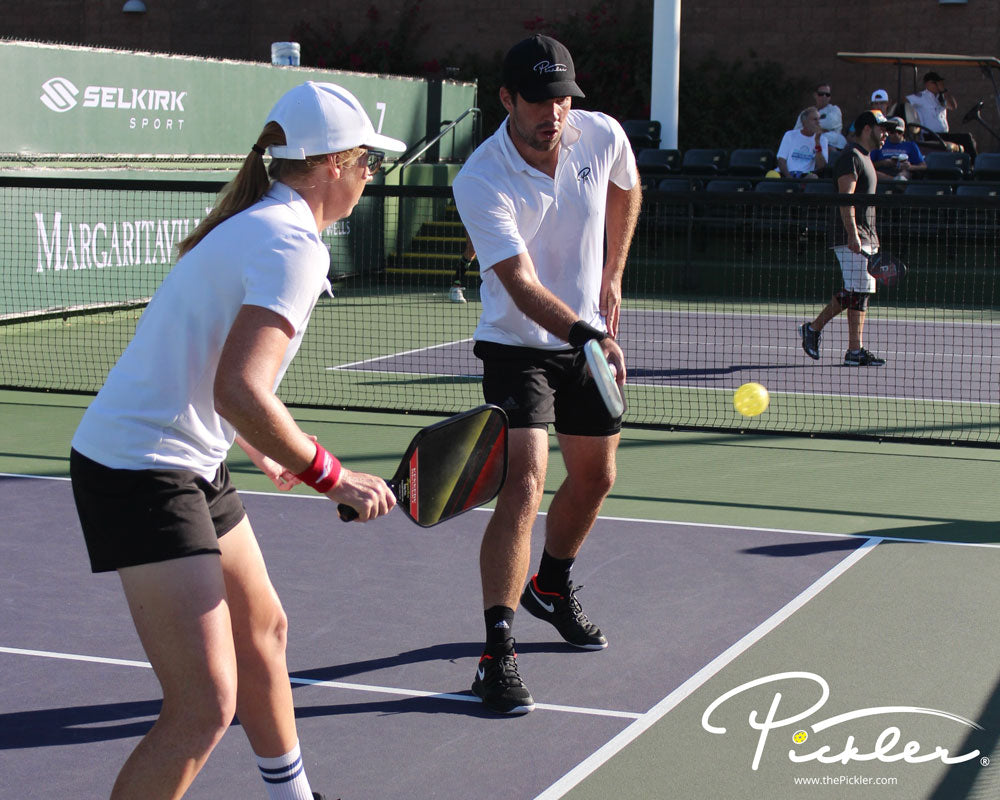
If you are looking to improve your dinks on the pickleball court, focus on these basic steps and fundamentals for hitting the perfect dink. These basic steps and fundamentals are the foundation of any great dinker on the pickleball court. Once you master these 11 steps, you can amp up your dinks and work on being more aggressive by slowly adding in speed, spin, placement, and angles, as well as working to improve your dinking strategy.
WANT MORE PICKLEBALL TIPS AND STRATEGIES?
For more on pickleball dinking strategy, check out Pickler’s pickleball blog, “Pickleball Dinking Strategies: 7 Tips to Win the Dink Battles.”
Plus, if you want more pickleball tips and strategies on every aspect of your pickleball game, check out Pickler’s online video lesson collection called My Pro Pickleball Coach. My Pro Pickleball Coach is a fraction of the price of one clinic or even one lesson, and features over 140 video lessons (over 7 hours of instruction!), as well as a corresponding e-book. These online video lessons are available on demand 24/7 and breakdown every aspect of the sport of pickleball, including pickleball drills, strategy, and advanced concepts, so you will play your best pickleball.
